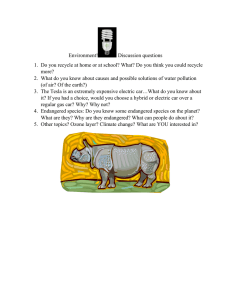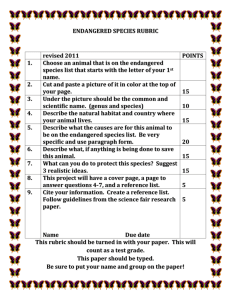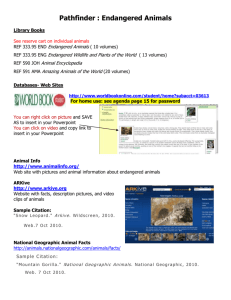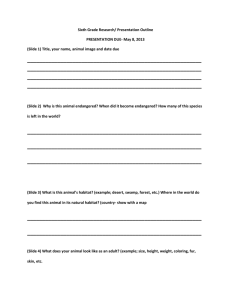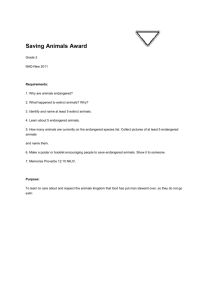11-736 Seminar on Endangered Languages
advertisement
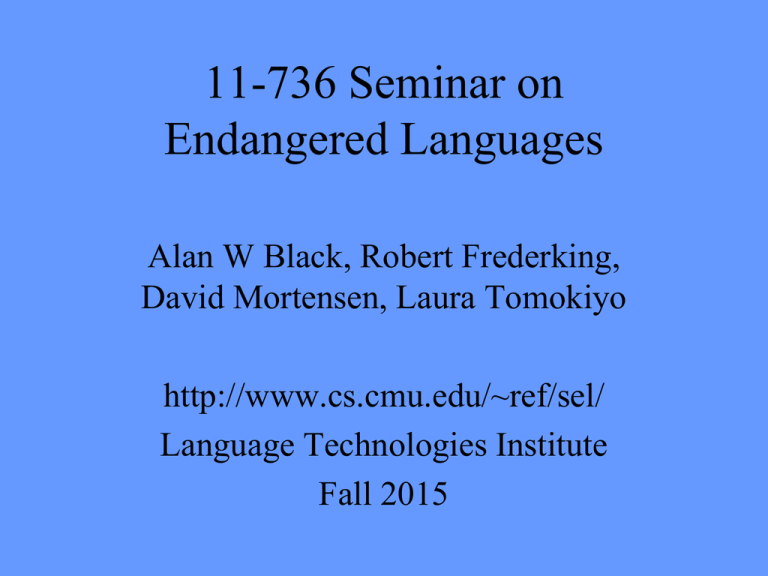
11-736 Seminar on
Endangered Languages
Alan W Black, Robert Frederking,
David Mortensen, Laura Tomokiyo
http://www.cs.cmu.edu/~ref/sel/
Language Technologies Institute
Fall 2015
[Intro: see class announcement]
Administrivia
•
•
•
•
Please register!
Slides will be available on website
Regular meeting time?
Readings, presentations; 14 weeks, incl. today
• For next week, read handout from “Language Death”
(David Crystal)
– Individual projects in Tech for Endangered
Languages
• Everyone signed in?
What are Endangered Languages?
[From here on, REF’s version, drawn largely from
“Language Death” (Crystal)]
• The size of the problem
– How do you count languages?
• How do you count Arabic? Flemish?
– How do you estimate unknown languages?
– How do you evaluate the status of a small
language?
• Not just size (Zuni)
Normal languages are odd (to us)
• Natural situation of a language is oral
– No dictionary, spell check, books, or even name
• Natural situation is local
– No writing or telephones: if you don’t live nearby,
your dialect will drift
• Standard national languages are a recent thing
– More obvious in Europe/Africa/Asia
• Other languages/dialects are always political
Real minority languages:
Spanish vs. Apache:
885000000
332000000
322000000
300M???
…
7372000
…
300000
148530
120000
12693
6413
775
…
4
…
0
CHINESE, MANDARIN
SPANISH
ENGLISH
Arabic? [if all local versions included together]
HAITIAN CREOLE FRENCH
ADYGHE (Russia)
NAVAJO
NYORE (Kenya)
APACHE, WESTERN
ZUNI
TLINGIT
600th
1000th
3000th; less than 10k
PAWNEE
AFRO-SEMINOLE CREOLE
(http://www.sil.org/ftp/ethnolog13/langpop99.zip)
North Park, Pittsburgh
Or maybe Mingo?
Why should we care?
• We need diversity
• Languages express identity
– [REF/German]
• Languages are repositories of history
– And Culture
• Languages contribute to sum of human
knowledge
– Ethnobiology, technology
• Languages are interesting
And it's not hopeless
•
•
•
•
Welsh
Maori
Hawaiian
Cornish (may have been extinct)
Description vs. Documentation vs.
Revitalization
• Linguistic Description
• Language Documentation
– “Sleeping” languages: Miami
• Language Revitalization
What can LT do about it?
• Build MT systems?
LingWear for the Information Warrior
New Ideas
• The pre-development of appropriate interlingua
representations for domains of interest facilitates
generation into a new language within two weeks.
• The development of new MT engines (e.g.
learnable transfer rules) and improved multi-engine
integration supports rapid deployment of MT for a
new language with scarce resources.
• Gisting and summarization in the source language
followed by MT is better than vice versa.
Impact
• Allow military and relief organizations to converse
in limited domains of interest with the local
population in an area of conflict and/or disaster
• Allow military and other operatives in the field to
assimilate foreign language information they
encounter on-the-move
• Rapidly port and deploy the technology into new
languages with scarce resources
Schedule
• 9/2000: Baseline MT systems functional.
•12/2000: Baseline text summarizer functional.
•9/2001: Port to second language complete.
•9/2002: Port to third language complete.
Carnegie Mellon University School of Computer Science: A.Waibel, L. Levin, A. Lavie, R. Frederking
Diplomat:
Rapid-deployment, wearable,
speech-to-speech translation
• Develop a new language in weeks, graceful
improvement for months or years.
• Speech in, speech out.
• Use user interaction to cope with errors.
• Human factors of working with computer naïve users.
• Languages: English and {Croatian, Haitian Creole,
Spanish, some Korean, (Arabic)}
AVENUE:
Low Cost MT for Minor Languages
• Speakers of electronically underrepresented
languages can participate in the information
age.
• Policy makers can access ideas, viewpoints,
and information from the developing world.
• MT for unforeseen translation needs: e.g.,
humanitarian aid.
• Documentation and preservation of
endangered languages.
What can LT do about it?
• Build MT systems?
– AVENUE experience: the community didn’t
want state-of-the-art MT, but project had been
funded to build MT!
• Haitian Creole was difficult, but still not
small enough to be endangered!
• New language technology methods that the
community can use themselves to save their
language?
What can LT do about it?
• Three of the main ways languages die:
– children don’t learn them; [REF/German]
– teenagers forget them;
– young adults forget them
• Spelling checkers, SMS, etc.
• Navajo.org [Dene] (but in English!)
– Winnebago [Hochunk] website errors
• Etc.?
Only the beginning…

